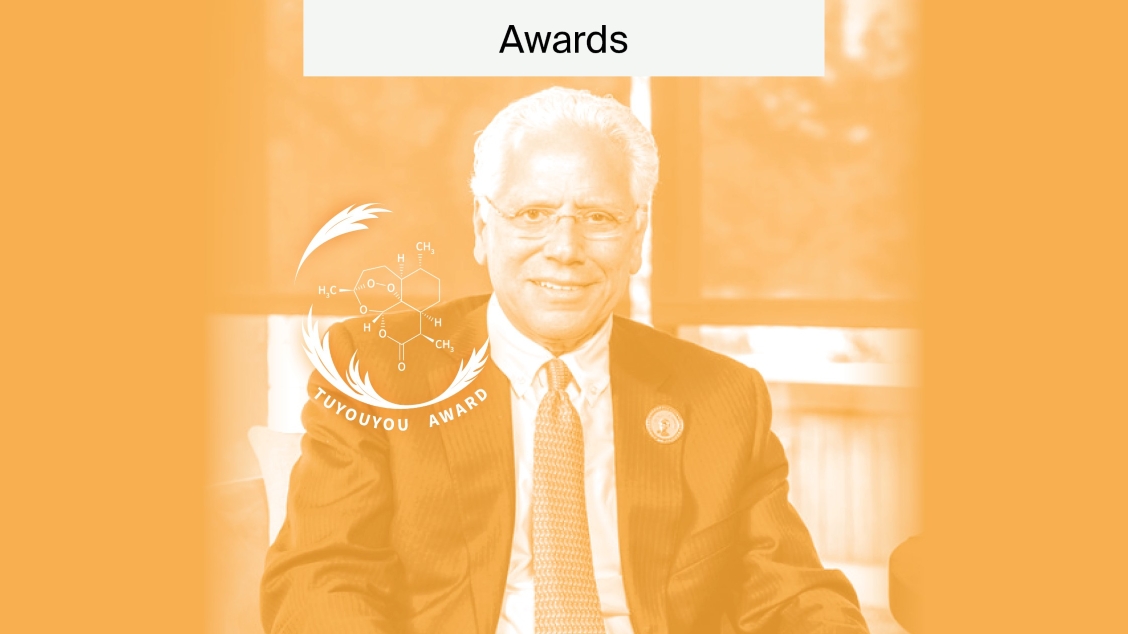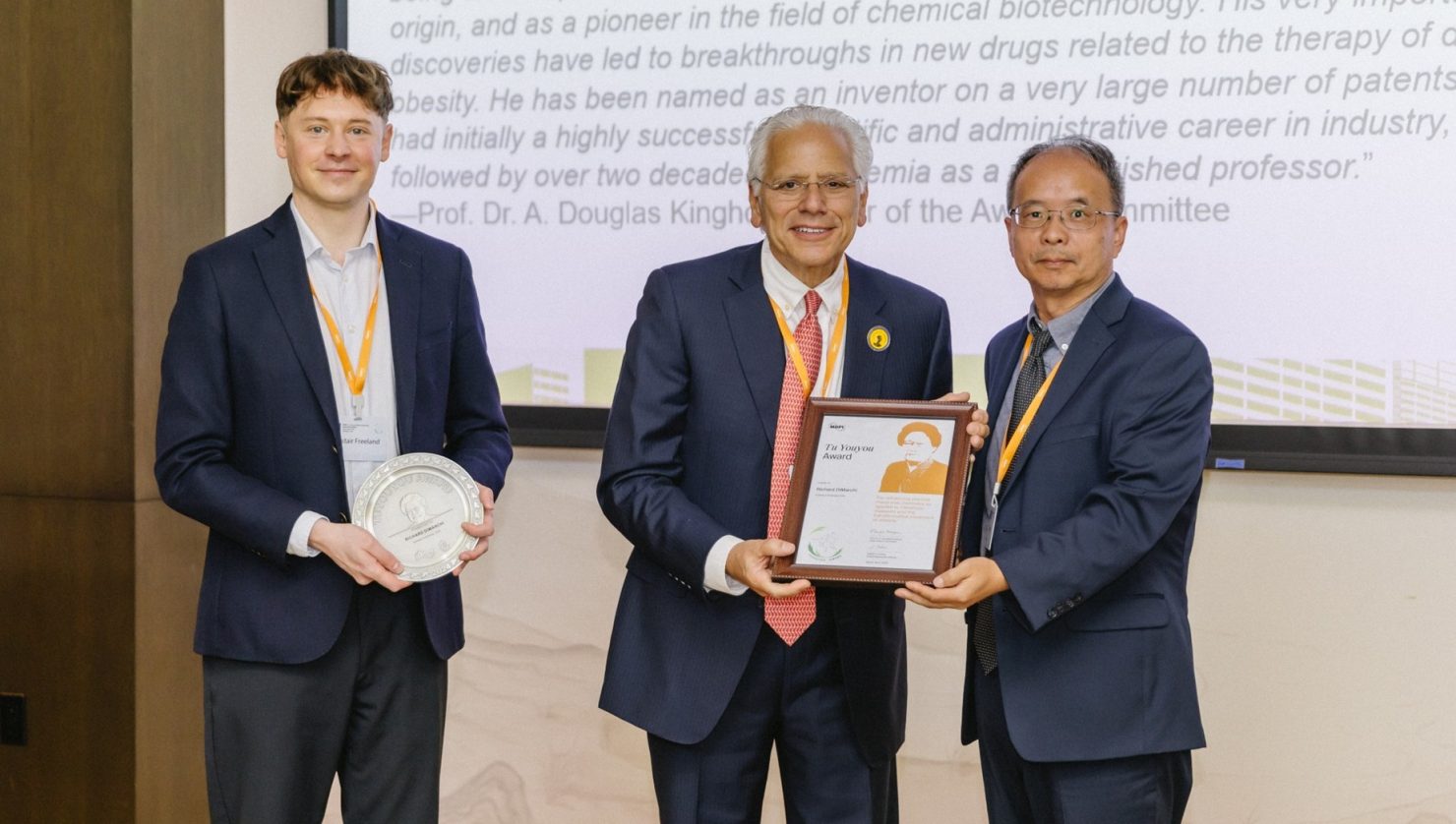
Prof. Richard DiMarchi: Winner of the 2024 Tu Youyou Award
Professor Richard DiMarchi is a pioneering biochemist at the forefront of the scientific conversation. An esteemed scientist and dedicated teacher, Professor DiMarchi has been instrumental in the development of the GLP-1 receptor agonists, which have influenced revolutionary medications for diabetes and weight loss.
Alongside Professor Rolf Müller, Professor DiMarchi was awarded the 2024 MDPI Tu Youyou Award earlier this year. Regarded as an exceptional leader in the medicinal chemistry of peptides and proteins of natural origin, Professor DiMarchi’s contributions embody the spirit of innovation and excellence that the Tu Youyou Award represents.
Following the recent Tu Youyou Award ceremony, Professor DiMarchi sat down with Ryan Siu, MDPI’s Institutional Partnerships Manager for North America, sharing insights into his career, thoughts on the future, and advice for emerging scholars.

Professor Richard DiMarchi accepting his award at the 2024 Tu Youyou Award Ceremony
Watch the full interview with Professor Richard DiMarchi
Professor DiMarchi’s early career and mentorship
For Professor Richard DiMarchi, his motivations for pursuing a career in chemistry were as simple as embracing his natural strengths:
“I think we all tend to favor what we do best. And I don’t have a breath of talent, right? I don’t speak foreign languages. I don’t have artistic ability. I’m a rather quantitative person, and chemistry struck me as a quantitative physical science that had translational value.”
Now a Distinguished Professor of Chemistry and Gill Chair in Biomolecular Sciences at Indiana University, Professor DiMarchi’s extensive career across academia and industry has been characterized by scientific excellence and innovation.
After completing a PhD in Biochemistry at Indiana University in 1979 and fellowship at The Rockefeller University, Prof. DiMarchi began research in an industry that had not yet embraced the ‘miraculous magic’ of the macromolecules that would be central to his transformative contributions. He reflects:
“I mean, it’s been a journey of nearly 50 years, beginning before the inception of what we now know as the industry of biotechnology. And the magic, the miraculous magic of these macromolecules, peptides, proteins, antibodies, RNA-based therapeutics. I’ve long been a great believer in the performance of these molecules, their capability, and that is what has crafted my career over the course of these last four and a half decades.”
Looking back, Professor DiMarchi credits the collaborators and mentors who have been instrumental to his career. He particularly remembers protein chemist Frank Gurd and Nobel Laureate Bruce Merrifield as notable figures in his early development.
While at the Lilly Research Laboratories, where he would spend over two decades, he learnt how to construct proteins biosynthetically under the broad tutelage of Irving Johnson. Alongside Gus Watanabe, the former Chief of Medicine at Indiana University, DiMarchi developed his medical knowledge, laying the biological foundations for his current success.
Additionally, he highlights the “seminal importance” of Suad Efendic, with whom he first observed the efficacy of native GLP-1 in obese diabetic subjects and Matthias Tschöp with whom he pioneered the field of incretin-based multi-agonism. DiMarchi maintains that this foundation has “propelled [his] interests that have yielded what we’ve clinically witnessed in more recent years”.
“I feel very fortunate to have been at this point in history, surrounded with people that have been phenomenal mentors, phenomenal collaborators to achieve what we’ve been able to contribute.”
A transformative discovery
Professor Richard DiMarchi’s contributions to the development of GLP-1 receptor agonists have helped revolutionize metabolic medicine. His work has influenced a wave of treatments, including the first GLP-1 medicines, which are more readily recognized under brand names such as ‘Ozempic’, Mounjaro’, and more.
Initially designed as a treatment for type 2 diabetes, these novel therapies have shown great effectiveness in managing excess body weight. They have become so widely used that a recent sample survey found that nearly 12% of Americans had used a GLP-1 weight loss medication, and a further 14% would be interested in taking them.
Prof. DiMarchi is quick to contextualize the significance of GLP-1 treatments but firstly emphasizes that breakthroughs such as these are never easily achieved. He explains:
“Well, it’s the outcomes that define what a breakthrough is. And so, all of this is an experiment in process. That’s the beauty of what we do, right? Life is an experiment.”
For Prof. DiMarchi, the continued success of GLP-1 therapies has been tremendously rewarding, not just as a pharmaceutical triumph but as a catalyst for encouraging healthier lifestyles.
“…what we’re seeing is a transition from the traditional thinking of a pharmaceutical industry focused on treatment of disease to how do we strengthen health, how do we actually propel and fortify later life, healthy existence, as opposed to waiting for the problem and then trying to fix it after it emerged.”
He continues:
“And so even beyond the pharmaceutical interventions, I see far more interest in folks thinking about their diet, their lifestyles, exercise – to supplement or substitute for these miraculous peptide-based therapeutics.”
Through his breakthroughs in peptide therapeutics, Prof. DiMarchi has altered the lives of those with diabetes and obesity. He is quick to redirect credit to those that did the earliest work, laying the foundations for his and others’ contributions. “It has been a lengthy journey measured in decades to achieve something of this significance”, he says. For him, seeing the positive outcomes has been highly validating, especially in repositioning obesity and metabolic disorders as treatable medical conditions.
Seeing these treatments as renewal, he is hopeful in the ‘second chance’ that they offer to patients. Prof. DiMarchi explains:
“…when people realize the health benefits that they witness in periods measured in weeks and certainly months, they begin to realize the sort of subliminal means in which unhealthy lifestyles, excess weight, excess body fat have proven to be toxic over time. You know, if you reverse it and restore this health, you then come to appreciate what you had lost.”
Advice for emerging scholars
As a tenured professor, Professor DiMarchi remains committed to nurturing the next generation of outstanding scientists. Much of his advice to his students focuses on the morals of perseverance and patience, continuing to stress that scientific breakthroughs of this scale do not happen overnight:
“Patience is important. Having that ability to manage your composure through the highs and the lows of scientific experimentation. You spend far more time in what I call ‘the valley of death’ than you do on the summits, looking down and celebrating.”
However, he affirms that a genuine interest and care for their work is essential for any aspiring scientist:
“…my recommendation to students is that they pick something that they genuinely enjoy, are excited about doing on a day-to-day basis, to sort of transcend what one might define as employment…”
Professor DiMarchi argues that employability should be prioritized over employment, believing that a strict belief in what they are setting out to achieve is non-negotiable. He reminds his students to have integrity, emphasizing their responsibility to society as the next generation of pioneering researchers:
“Surround yourselves with outstanding intellects, people who have the highest ideal but impeccable integrity as to what they are doing, why they’re doing it, how they’re doing it (…) No coloring, no shading, no overt lies, because we’re dealing with people’s health, right?”
Reflection on the award
As co-recipient of the 2024 MDPI Tu Youyou Award, Professor DiMarchi is no stranger to critical acclaim, already boasting an impressive arsenal of accolades. Following his groundbreaking contributions, Prof. DiMarchi’s profile will no doubt continue to grow. Nonetheless, he remains humble and honored to receive this prestigious award:
“All of these awards and the attention that they bring up is personally humbling and now leads you to ask, are you worthy of this? Because there are so many people who are deserving and so many who go on unrecognized.”
Inspired by the award’s namesake, Professor Tu Youyou, DiMarchi says that her commitment to science and her patients is “inspirational and, quite frankly, infectious in wanting to make a similar contribution”.
Looking towards the future, Professor DiMarchi wishes the future Tu Youyou laureates an early congratulations. “I don’t know who they are at this point in time, but I’m sure that the process and the informed individuals that make this selection will pick individuals that are justifying of this award”, he says.
“Once again, we don’t do this work for applause, right? It’s lovely and gratifying when it comes, but we do it because there is a purpose … You must have this innate love of what you do on a day-to-day basis to get you up in the morning, in to work early, stay late and consumed with it. And so, I expect these next awardees and the ones who come after that will be most deserving.”
2026 Tu Youyou Award
The MDPI Tu Youyou Award will open for nominations in 2026 for researchers who have made outstanding contributions to the fields of medicinal chemistry and natural products chemistry.
Visit the Tu Youyou Award website to learn more.
Celebrating and recognizing the achievements of researchers is central to MDPI’s mission to foster high-quality Open Access scientific discussion. MDPI hopes that awards such as these inspire academics to continue their incredible work.
Click here to learn more about MDPI’s Awards program.










